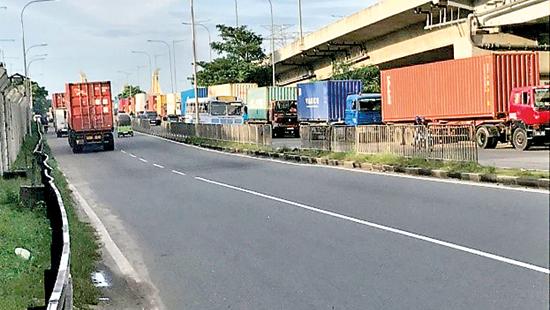22 Jul 2024 - {{hitsCtrl.values.hits}}

Congested roads
The country not only needs digital reforms urgently but also process reforms to eliminate the delays, cost and corruption that are taking place throughout the year, due to the restricted cargo examination process adapted by Sri Lanka Customs and the government.
cargo examination process adapted by Sri Lanka Customs and the government.
Reports have been submitted and two years ago came the Kerawalapitiya public-private partnership project, where a feasibility study was carried out and the project layout was done. I too was invited for this committee but nothing happened.
The scope of the examination is not limited to the sea cargo imported for home use. The sea cargo imported for the industries operating under the Board of Investment, Temporary Importation for Export Programme and importation under the Customs Bonded Scheme, are also subjected to examination by the customs, in an environment that is congested most of the time and delays can take up to one week or more to clear a container.
Currently, full container loads of import cargo are examined at only Grayline Yard I, Grayline Yard II and Rank Container Terminal, making them congested. It is costly with many hidden costs and is leading to full-scale corruption.
The current system is simply harassing the truck drivers to all business owners in the logistics supply chain and finally all costs are passed on to the consumer and exporters who are importing for manufacturing. In some cases, it is reported that the landed operation costs are higher than importing the container by paying freight.
Solution
The government needs to liberalise the sector fast, with a proper regulatory framework and select suitable container deport operators numbering up to 15 and converting them into a bonded facility through a tender process. This can be done in many ways to facilitate trade and help the local businesses to generate more business and be more productive to the trade.
Using modern technology and intelligence will help minimise inspections as done in other countries. Sri Lanka cannot have duopolies and monopolies in every operational aspect in logistics, harming the legitimate trade and traders and finally the country’s interest itself.
The liberalisation will help the Sri Lanka Ports Authority to have more yard space to handle transshipments, as the import containers can be diverted immediately to the relevant local yards for handling and clearance. At the same time, operating in a number of locations will help analyse data more independently by the Finance Ministry, in the process of valuation and track government revenue, in a more transparent manner, as each location can independently be monitored through a centralised digital system that can be linked to the proposed Single Window facility at a later stage.
The government at every forum has been talking of promoting exports but rarely look at the bottlenecks already in place, making cost escalation. The National Export Strategy document has been talked about but ignored. The reason for all this, in my opinion, is that people who don’t understand operational pain-points stick to theory that cannot be implemented on the ground and advise the government policymakers and of course, keeping the door open for corruption.
The National Single Window alone is not trade facilitation. Addressing the pain points of the trade with new operational process engineering are the steps one can take to cut short red tape and implement processes that would address the need of the hour.
(Rohan Masakorala, an economist by profession, with well over 32 years of experience in the shipping, international trade and logistics industry, is the founder of Shippers Academy International, a former Chairman of the Sri Lanka Shippers’ Council and first Secretary General of the Asian Shipper’s Council)
26 Nov 2024 43 minute ago
26 Nov 2024 2 hours ago
26 Nov 2024 3 hours ago
26 Nov 2024 4 hours ago
26 Nov 2024 4 hours ago